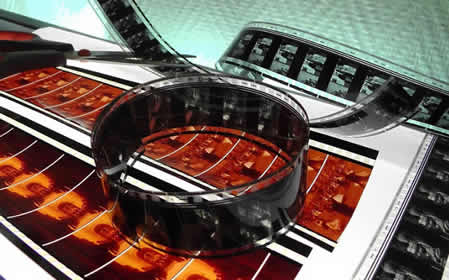Handling old film can get tricky. Film is by nature delicate, so it needs to be handled with care. Over time, its condition will invariably deteriorate, so an even higher level of care is required.
In most cases, we don’t recommend that you handle the film. If your intention is to take your 8mm, 16mm or Super 8mm film and convert it, or transfer it to a digital format, like DVD, Bluray or mp4, then simply send the reels to us. You’ll receive them back fully inspected, cleaned, spliced, lubricated and repaired – at no additional cost. So you never actually have a need to handle them and risk damage. But just in case you’re curious, here are a few tips.
Tips For Handling Old 8mm, Super 8mm or 16mm Film
It may be obvious, but I’ll say this anyway. Always and only handle film by the edges, and don’t touch either of the flat surfaces of the film with your hands or fingertips. The reason is that any dirt (even tiny, tiny specs), or skin oils from your hands, can harm the film. Wearing 100% cotton, tight weave gloves may also be a good idea if you do need to handle it.
If you’re inspecting the condition of the film, check for any tears or breaks in the film. These are particularly prevalent in the sprocket holes on the edge, because it’s where the projector pulls the film along its path. Broken sprockets can lead to the film tearing or breaking.
If you’re going to risk viewing it in a projector (not recommended, if you’ll be sending it in for transfer to digital anyway), make sure you check the projector, ensuring that it’s functioning properly. The film’s threading path must be clear and clean. Even a small amount of dust or dirt, in the projector can scratch the film, as it winds its way along the rollers.
Here’s a big one… don’t pause the film while projector lamp is on! This is a quick way to burn or even melt your film.
And perhaps another obvious tip, but when winding the film back onto its reel, make sure you’re careful not to allow it to get twisted, bent or folded over. Wind it up flat.
Unless you’re an old film buff with a lot of time, equipment and experience, simply pulling the old reels out of a box, and loading them onto a projector that’s been sitting around for years, poses a fair amount of risk to your film – and treasured memories.
If your objective is to view them and preserve them, having your 8mm, 16mm or Super 8mm film converted, and then transferred to DVD, mp4 or Bluray is probably the lowest risk option, and the most economical.
When you have a lot of reels, you may want to take a quick look to see if you want to preserve them, or not. But with film, there’s no such thing as a “quick look”. The entire process of taking them out of the container and handling and loading the film into a projector (new or old) exposes the film to the risk of damage.
It’s a judgement call of course, and you’ll have the weigh the risk of damage to the film against converting and preserving film you may not have wanted to preserve. Of course, if the film is black, we won’t charge for the conversion… since there’s nothing to convert.

